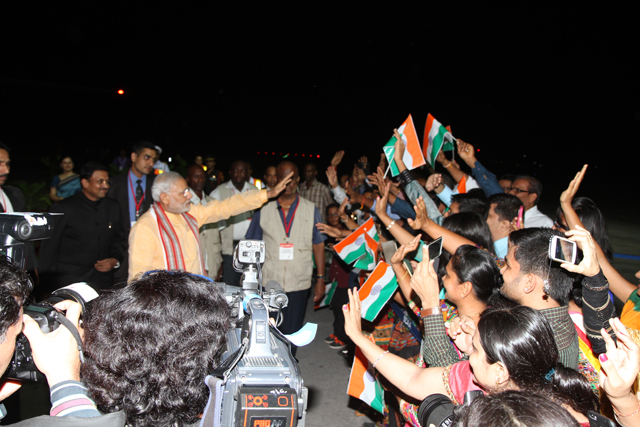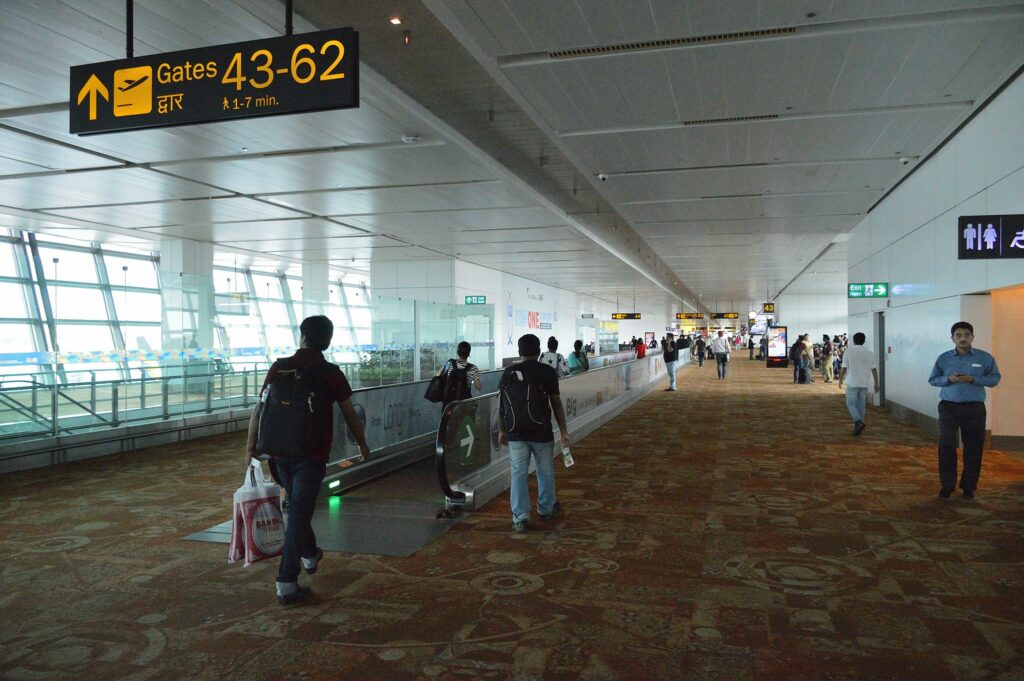
India has been experiencing an increasing outflow of its citizens. On December 1, 2021, Nityanand Rai, Union Minister of State for Home Affairs, informed Parliament that 881,254 Indians had renounced their citizenship over the past seven years. This exodus comes as the current government expands its outreach to the Indian diaspora. Prime Minister Narendra Modi has advocated for seeing the diaspora as a strategic asset, while spearheading a narrative that celebrates the diaspora and the government’s initiatives to support its members.
In 2017, the Prime Minister said: “The present government’s initiative changed brain drain to brain gain.” Beyond just a tool for harnessing the diaspora to contribute to India’s development, the brain gain narrative is a powerful tool to enhance Modi’s appeal, legitimacy, and support. It is also a call to the Indian diaspora, especially in the West, to contribute to India’s development through foreign remittances, investments, and knowledge transfers. This narrative helps him project his ability to bring change to Indian society, which was the primary election plank he rose to power in 2014.
However, many political and policy responses contradict the government’s narrative despite it taking center stage in diaspora engagement and domestic politics. While the brain gain narrative serves the government’s interest by feeding into the popular nationalist imagination of a rising India, the causes of increasing human capital flight remain egregiously overlooked. These issues cannot be addressed through rhetoric and narratives. Instead, they require thinking beyond the confines of partisan politics and shifting the exceeding focus on the narrative of brain gain to resolving structural constraints.
Not Brain Drain but Brain Gain
Brain drain refers to the large-scale migration of educated workers and skilled professionals to developed countries searching for higher salaries, better working conditions, investment opportunities, access to advanced technology, more stable political conditions, and a better standard of living. Migration trends have led some to predict a “great Indian brain drain,” with significant socio-economic ramifications for India. In just one example, a study conducted by the Associated Chambers of Commerce and Industry of India stated that Indian students studying abroad cost India 17 billion in revenue as most of them do not return.
While the brain gain narrative serves the government’s interest by feeding into the popular nationalist imagination of a rising India, the causes of increasing human capital flight remain egregiously overlooked.
Brain gain primarily denotes harnessing the technical, economic, and social capital of overseas Indians for India’s development. When Modi came to power, he advocated for India to embrace its diaspora with pride instead of thinking of diaspora members as less Indian. Modi, on many occasions, claimed that his government has successfully transitioned India from a brain drain economy to a brain gain economy, embedding the narrative in diasporic outreach and domestic politics. The conferring of the Padma Bhushan, the third-highest civilian award in the country, to the Google CEO Sundar Pichai and the Microsoft CEO Satya Nadella, which many felt awarded too soon, is part of this narrative celebration. To its credit, the government claimed in 2017 that 1,000 Non-Resident Indian (NRI) scientists returned in the last 2-3 years. However, this pales in comparison to the over 880,000 Indians who renounced their citizenship in the past seven years.
The brain gain narrative fits and feeds into Modi’s popular nationalist imagination of a rising India. However, this narrative fails to interrogate the legitimate policy concerns that may prompt professionals in India to emigrate or question what can be done to attract and retain talent. The problem with nationalist narratives is that they fail to motivate action. While the brain gains narrative claims that all is well in India, ground conditions suggest otherwise.

The Exodus of Wealth and Talent
As things stand, alongside students and workers, India faces a steadily accelerating exodus of its wealthy population, including millionaires. Between 2014 to 2018, Morgan Stanley’s 2018 report found that nearly 23,000 millionaires have left India since 2014. Post-2018, the Global Wealth Migration Review reported that 7,000 Indian millionaires left the country in 2019 alone. Residence-and-Citizenship-by-Investment (RCBI) programs allow millionaires to secure residency permits and/or citizenship in other countries in return for monetary investments. For example, Portugal’s Golden Visa program provides residency for an investment of USD $500,000, while Austria provides residency and citizenship with a minimum investment of USD $900,000 going up to $11 million.
It would be incorrect to assume that emigration is driven exclusively by financial pull factors. Push factors that affect a citizen’s lived experience in India are also crucial. Harassment by tax officials, difficulties in conducting business, a polarizing political climate, violence against minorities, women’s safety, increasing pollution, traffic, and an underwhelming health care system continue to trigger emigration. The COVID-19 pandemic only accelerated the problem. During the second wave in 2021, India’s health care system went for a toss. As people scrambled for hospital beds and oxygen cylinders, the rich realized that having wealth alone is inadequate in the absence of necessary infrastructure and governance, adding to the ever-piling factors affecting India’s outmigration.
Overarching Political Concerns
The gap between narrative and reality—the celebration of popular desires over concrete accomplishments—manifests overarching political interests, concerns over policy, and administrative considerations. Retired Indian Administrative Service (IAS) officer Shaktikanta Das’ appointment as governor of the Reserve Bank of India (RBI) raised concerns about partisan preference and his technocratic ability to oversee a critical financial institution. Incidentally, Das, who holds Masters in History, also became the first non-economist appointed to the office since 1990. Das led the government’s controversial demonetization drive, strengthening the plausibility of the government seeking substantial political alignment within the governor’s office.
Moreover, the government is not always able to attract or retain experts in government service. Das’ appointment came after Raghuram Rajan decided to exit after his first term, followed by the resignation of the latter’s successor Urjit Patel. The two well-known economists were reportedly unhappy with the government’s interference with the RBI. This follows a spate of high-profile resignations and refusals by well-reputed, American-based economists under various portfolios such as Aravind Panagariya, Raghuram Rajan, and Arvind Subramanian. This speaks to the governmental failure to provide a conducive environment for bureaucratic functioning.
The Indian government continues to pursue political gains over meritocracy, which does not help facilitate an environment that could lead to India becoming a net brain gain economy.
Similarly, the failure to recognize talent is also remarkably evident in the government’s inability to repatriate and retain diasporic talent. It is curious that the Indian-origin Harvard professor Gita Gopinath, who later became the chief economist of the International Monetary Fund, did not find a place in the government. Presumably, Gopinath’s role as the economic advisor to the Communist party-led Kerala government, a political rival of the ruling party BJP, might have dissuaded the government from acting on her candidacy. Her lack of consideration was especially curious because she shares relative ideological alignment with the government being a staunch votary of capitalism and economic liberalization. Moreover, the government’s professionally demeaning remarks against Nobel laureate Abhijit Banerjee raise questions about the leadership’s ability to rise above partisan politics towards working in the letter and spirit of realizing the narrative of brain gain. Even more ironic is that the current government’s record of retaining talents in bureaucracy and policy-making pales compared to the 1980s and 90s. Previous governments, especially under Rajiv Gandhi, successfully brought and kept many Western-educated and experienced individuals, including Sam Pitroda, Jayanta Roy, Bimal Jalan, and Montek Singh Ahluwalia, Manmohan Singh, Jairam Ramesh, and Rakesh Mohan.
Conclusion
Unfortunately, the government’s rhetoric does not match its practice. As the government claims to have been striving to harness the Indian diaspora for national development, overarching political concerns continue to imperil potential gains. The Indian government continues to pursue political gains over meritocracy, which does not help facilitate an environment that could lead to India becoming a net brain gain economy. To do this, the government must address governance issues, create a conducive environment to retain and attract high-skilled workers, and transcend political indulgence in public policy to add value to the brain gain narrative. Focusing on retention rather than repatriation—through improved education and research facilities, improved job opportunities with competitive salaries, bringing more women into the labor market, and improving public services in terms of value for tax—is the first step to reduce the mismatch between the government’s narrative and country’s reality.
***
Image 1: Mervyn Marie, Seychelles News Agency via Wikimedia Commons


